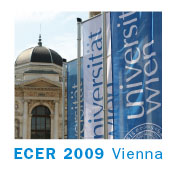Two Solitudes: Educational Research and the Pedagogical Realm
Prof Roland Reichenbach, University of Basel, Switzerland
- Between banality and confusion...
- Functional dilettantism and “theorylessness” in educational research
- Educational reforms, illusions of control, and the teachers...
There is much to be positive about in the current field of educational research. Now a burgeoning research domain in many European countries, diverse national and international studies are currently officially supported both politically and economically. However, on closer examination the actual effect of many prominent studies is sobering. Despite the fact that research methodologies and methodological awareness have in general improved a lot in recent years, it remains difficult to ascertain the true significance of the many research attempts to which the general public – not only educational researchers – is exposed. On the one hand, there are obviously many relevant educational research topics and projects, yet on the other hand it seems to be rather rare that one is confronted with clearly detectable epistemological interests. To put it another way, it is uncommon to find in educational research “real” research questions, or in fact any questions at all. “What is your question?” is a tough question to answer convincingly in the field of educational research. The general claim that our research domain is full of pseudo-questions is probably unfair and unacceptable, yet it is worth considering how often educational research truly deals with educational questions. The gap between pedagogical thought and educational research has achieved grand proportions. The idea of mutual profit between the two realms is now arguably simplistic, naive, and functional!
Providing empirical examples, this keynote lecture aims to address three intertwined topics and questions:
Firstly: In reference to some insights of Nelson Goodman (1951), why is it so difficult to raise (research) questions in the domain of education that offer a real opportunity to avoid either banal or confusing answers/outcomes?
Secondly: Is there still some significance of educational theory in educational research? How “theoryless” – and "questionless" – has educational research actually become? In this part of the argument the idea or concept of functional dilettantism (Wolfgang Seibel 1992) will be of some importance.
Thirdly and finally: Why do many teachers have great problems understanding the transformations and reforms of the educational system? And – referring to Niklas Luhmann (2002) and others – aren't their doubts absolutely justified?
References:
- Goodman, N. (1951). The structure of appearance. Cambridge, Mass.: Harvard University Press.
- Luhmann, N. (2002). Das Erziehungssystem der Gesellschaft. Frankfurt a.M.: Suhrkamp.
- Seibel, W. (1992). Funktionaler Dilettantismus. Erfolgreich scheiternde Organisationen im „Dritten Sektor“ zwischen Markt und Staat. Baden-Baden: Nomos.
